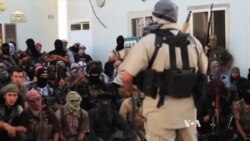The emergence of the Islamic State group in Iraq and Syria as a potent force in early 2014 changed the dynamics of the region.
Their brutal methods - including executions and forced slavery - horrified the international community, drawing Western forces into the conflict. It also splintered the war in Syria, where more than 200,000 Syrians have died in the conflict.
Known early on as ISIS, the group emerged from al-Qaida in Iraq; their rapid rise in 2014 shocked the international community, said Michael Stephens, the director of the Royal United Services Institute in Qatar.
“It was very clear that there were problems building up in Iraq at the end of 2013 but everybody was distracted by Syria. ... When ISIS actually did hit in Iraq, it changed the game completely,” he said.
Beginning in January
The Islamist group's first major victory was seizing the Iraqi town of Fallujah in early January, said Sajjan Gohel of the Asia Pacific Foundation.
"When Fallujah fell, that should have been a wake-up call," Gohel said. "We have sleepwalked into this problem and have got in very late in the game.”
In June the Islamist militant group seized Iraq’s second largest city, Mosul. Iraqi soldiers fled, and the militants seized their weaponry along with an estimated $400 million.
The group rebranded itself as the Islamic State group, seizing vast areas of northern Syria and Iraq.
In explaining the group's rapid advance, Gohel said, “They restored land taken by the [President Bashir al-Assad] regime to the tribes people. They allowed them to run their businesses. They married into families. So they enhanced their position locally.”
In contrast, Iraq’s Shiite Prime Minister Nouri al-Maliki was accused of discriminating against Sunnis and fuelling the insurgency. Under intense international pressure, Maliki resigned in August.
The United States and its allies, alongside Iraqi forces, came to the rescue of tens of thousands of minority Yazidis trapped on Sinjar Mountain by the Islamic State group's advance. Hundreds of Yazidis were killed; thousands were captured and forced into slavery.
Peshmerga forces
Kurdish peshmerga forces then took up the fight. The United States began airstrikes against the Islamic State group's positions in Iraq, and later Syria; it was joined by allies like Britain, and also Gulf Arab states - and most recently, Iran.
Islamic State fighters responded by beheading several Western hostages on camera - to the horror of the world.
“ISIS has united the international community, where you have partners that have often had very terse relationships, such as Iran and the United States, also the Gulf Arab countries that have never got involved in the battle against extremists in the past in a meaningful way," said Gohel, of the Asia Pacific Foundation.
Meanwhile, government forces under Syria's Assad continue to bombard rebel-held areas.
The Free Syria Army is fighting government and Islamist forces; desperate pleas for more Western arms are so far unheeded.
'More is needed'
Stephens, of the Royal United Services Institute, said that may change.
“I think next year what you will see is a more expressed commitment from the Americans as they realize more and more is needed in order to stop both Iraq and Syria collapsing into nothingness," he said.
As the threat posed by Islamic State militants grows, analysts say leaders will face increasing pressure to take on the terror group not only from the skies, but in the sands of Iraq and Syria.





